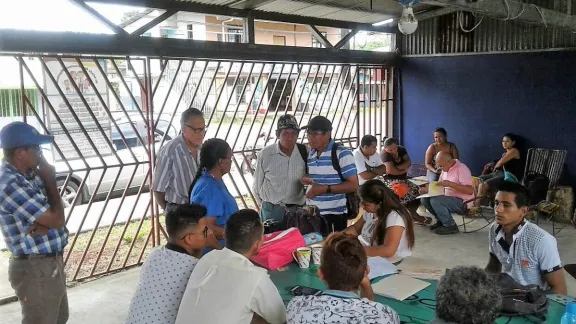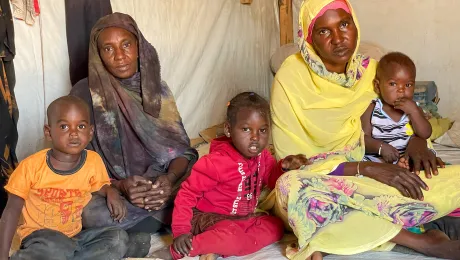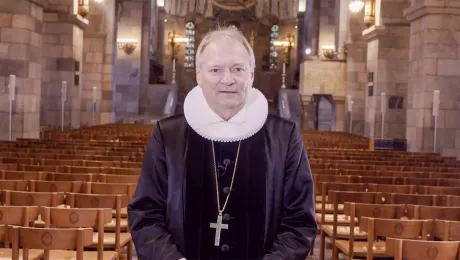
Meeting of migrants in Sarapiquà being assited with the necessary information on legal procedures for settling in the country and labor rights. Photo: ILCO
Costa Rican church assists youth and women seeking work in Nicaragua
(LWI) - The Lutheran Costa Rican Church (ILCO) says a project it started 10 years ago to integrate migrants is not only assisting hundreds of people each year but it has also increased awareness about the human rights of people seeking to settle in the country.
"As a migrant woman, it has not been easy to settle in Costa Rica. One has to adapt to culture, customs, a different lifestyle and discrimination. What gives you strength are your dreams, your goals for a better education and future for your children,” says María Obregón, coordinator of ILCO’s Project to Promote Migrants’ Human Rights.
Led by former migrants themselves, working around the northern Sarapiquí border with Nicaragua, the initiative empowers new arrivals with the necessary information on legal procedures for settling in the country and labor rights. They are linked up with public institutions that provide access to the judicial process of obtaining residency or citizenship.
According to the International Organization for Migration, Costa Rica hosts the highest number of migrants in Latin America, accounting for seven percent of its population of 4.8 million people. Nicaraguans make up 75 percent of the migrants, as they cross the border seeking work mainly in the agricultural and construction sectors as well as domestic work.
The ILCO project offers more than administrative procedures for residency and employment, according to Obregón. Migrants also receive financial support, spiritual guidance and counseling with support from the Roman Catholic Church and the Seventh-day Adventists.
Obregón says the situation is especially difficult for women, most of whom end up as domestic workers. "The mere fact of being a woman limits possibilities for preparation and integration into the labor force, one needs better opportunities for your intellectual development and to achieve this takes a long time. Today I feel lucky to have achieved some of my dreams. After 20 years I think I will have achieved my goal of seeing my children become professionals, studying at university and having a decent job.”
Complex process
To date around 450 migrants have received direct assistance through the ILCO project, though such help does not automatically lead to acquiring the legal documentation for residency or citizenship in Costa Rica. The administrative processes require lot of time to complete, Obregón notes.
Out of the 700 people ILCO accompanied in 2016 only 25 received documentation allowing them to stay on. "This result is not surprising," Obregón says. "One of the complex factors is the lack of necessary support from the Nicaraguan Consulate in Costa Rica, which slows down the application process. However, it is expected that the two governments will reach an agreement to make the procedure more efficient," she adds.
The final outcome is not only about the number of people who obtain their documents. It is also about the empowerment the migrants experience in defending and promoting their rights.
For ILCO, nevertheless, “the final outcome is not only about the number of people who obtain their documents. It is also about the empowerment the migrants experience in defending and promoting their rights,” Obregón says.
Promoting inclusive communities
The migrant assistance in Sarapiquí benefits predominantly young people, aged 18-29 years. Around 50 percent of them are not in gainful employment as there are considerably few job opportunities. Exploitation of migrant workers is acute in view of their legal status and significant levels of illiteracy as an estimated 10 percent of migrants can neither read nor write.
In this context, ILCO’s pastoral ministry shares the good news of the gospel with foreigners who, living in situations of vulnerability, receive the message of love and justice through the Word and God’s liberating action. They have access to justice and are accompanied in their daily lives with dignity, Obregón concludes.
The Lutheran World Federation (LWF), which ILCO joined in 2002, supports the church’s work of promoting justice and building inclusive communities. A relatively small church of 1,500 members, it also empowers youth, indigenous communities, people living with HIV and AIDS, the socially excluded because of sexual orientation, and women from poor backgrounds.


